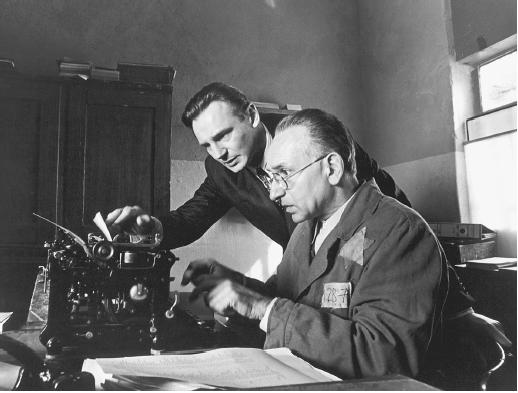Movie Review: Schindler’s List

Steven Spielberg was in the Never Won An Oscar Boat before 1993, when he had been nominated four times for Close Encounters of the Third Kind, Raiders of the Lost Ark, E.T., and The Color Purple. He didn’t even have any “vicarious” Oscars through Best Picture nominees he directed, such as Jaws. And with 1987’s Oscars, his Empire of the Sun was nominated for 6 technical awards, losing them all to The Last Emperor.
But 1993 was Spielberg’s year. In June, his Jurassic Park would go on to become the 2nd highest grossing film of all time (it’s now 12th), and Schindler’s List would be his stamp of achievement. Both films combined would go on to win 10 Oscars. Amazingly, Schindler’s List probably should have won more than the 7 it did on its own.
It’s World War II and the story of Oskar Schindler (nominee Liam Neeson, who lost to Tom Hanks in Philadelphia, which is understandable), a Nazi who recruited Jews as skilled workers in exchange for protection from the Nazi regime. He recruits an accountant, Itzhak Stern (Ben Kingsley, who somehow wasn’t even nominated), to round up as many laborers as he can find, with the help of financial backers. Schindler expertly makes it seem like he is getting cheap labor and running a scam, using the Jews in a different kind of abuse.
Different from what kind of abuse? Well, unless you’ve been living under a rock, perhaps you hadn’t heard about the Holocaust, and the other atrocities that didn’t end in death. Personified by Amon Goeth (Ralph Fiennes, who lost to Tommy Lee Jones for The Fugitive), we see some brutal stuff, killing for sport and really no other reason, rifling down workers at a concentration camp from his balcony like it’s his morning coffee.
Schindler “befriends” Goeth, a move that helps Schindler keep his ruse going and gives him a powerful ally at important junctures. As the encampment situation gets worse, even Schindler’s workers aren’t safe, and so he uses all the money he has collected from his business to save them, turning them over into a new business making artillery shells, as other Jews are sent to Auschwitz.
Beyond that simple plotline, Spielberg fills the movie with an almost avant garde look into the brutality of the Nazis. The beatings, the sport killing, the humiliations. It’s what makes the movie powerful and not just another biopic.
There has been some criticism, of course, that Spielberg still makes a movie with serious subject matter his own personal showcase, a need to entertain even when the topic is brutal. I’m not really sure how else he could have done this, but it goes to show even a movie like this can’t please everybody. It’s not really one of my favorites all told, but it’s an excellent picture and demands to be seen. Neeson, Fiennes, and Kingsley are at their very best here.
Schindler’s List was going to beat anything it went up against, so here was its fodder: Andrew Davis’ The Fugitive, Merchant/Ivory’s The Remains of the Day, Jim Sheridan’s In the Name of the Father, and Jane Campion’s The Piano.Â
Oscar-winning writer Steven Zaillian had an amazing year, too, with this and his directorial debut Searching for Bobby Fischer (also starring Kingsley). John Williams won his fourth Oscar for Original Score (in 25 nominations, at that time, just for that category alone).Â
Comments
Write a comment
You must be logged in to post a comment.
Comment from Jonathan Watkins
Time: February 25, 2007, 10:58 pm
Yeah, it almost seems un PC to say, but as much as I love “Schindler’s List,” I wouldn’t even say it’s my favorite Speilberg film. I still prefer early Speilberg, the mack daddy being “Jaws,” but also the first two Indiana Jones films (Yes, I do like “Temple of Doom”), “E.T.,” “Duel,” and “The Color Purple” will always come to my mind before “List.” Some of those might not necesarrily be better films, but they will always be what pops in my mind first when I think of Stevie.